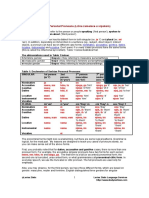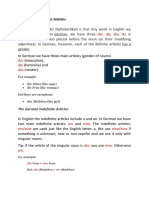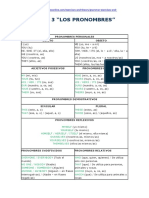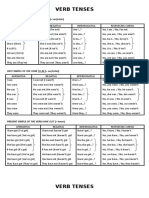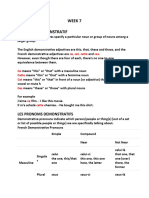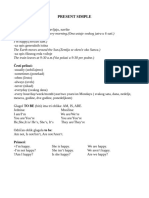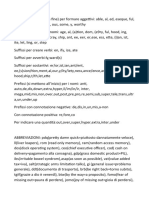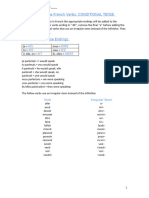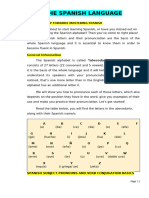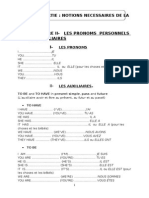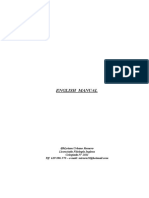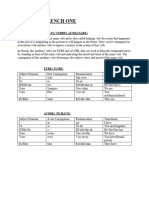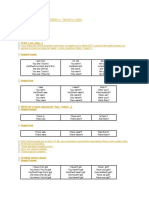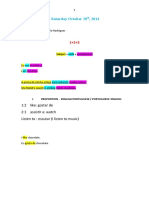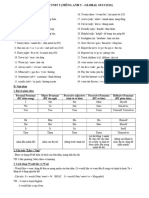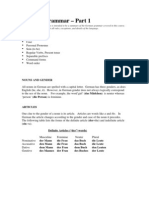0 ratings0% found this document useful (0 votes)
11 viewsWAS Were: Were Ing Was Ing Were Ning Were Ning
WAS Were: Were Ing Was Ing Were Ning Were Ning
Uploaded by
danThe document provides information on Spanish verb conjugations for the present and past tenses. It lists:
- Subject pronouns and their conjugated verb forms for "to be" in the present and past tenses.
- Affirmative and interrogative sentence structures for the past tense.
- Affirmative, negative, and interrogative sentence examples using the past tense conjugations.
- Reflexive pronouns and examples of their use.
Copyright:
© All Rights Reserved
Available Formats
Download as DOCX, PDF, TXT or read online from Scribd
WAS Were: Were Ing Was Ing Were Ning Were Ning
WAS Were: Were Ing Was Ing Were Ning Were Ning
Uploaded by
dan0 ratings0% found this document useful (0 votes)
11 views3 pagesThe document provides information on Spanish verb conjugations for the present and past tenses. It lists:
- Subject pronouns and their conjugated verb forms for "to be" in the present and past tenses.
- Affirmative and interrogative sentence structures for the past tense.
- Affirmative, negative, and interrogative sentence examples using the past tense conjugations.
- Reflexive pronouns and examples of their use.
Original Description:
Clases de ingles
Original Title
Ingles
Copyright
© © All Rights Reserved
Available Formats
DOCX, PDF, TXT or read online from Scribd
Share this document
Did you find this document useful?
Is this content inappropriate?
The document provides information on Spanish verb conjugations for the present and past tenses. It lists:
- Subject pronouns and their conjugated verb forms for "to be" in the present and past tenses.
- Affirmative and interrogative sentence structures for the past tense.
- Affirmative, negative, and interrogative sentence examples using the past tense conjugations.
- Reflexive pronouns and examples of their use.
Copyright:
© All Rights Reserved
Available Formats
Download as DOCX, PDF, TXT or read online from Scribd
Download as docx, pdf, or txt
0 ratings0% found this document useful (0 votes)
11 views3 pagesWAS Were: Were Ing Was Ing Were Ning Were Ning
WAS Were: Were Ing Was Ing Were Ning Were Ning
Uploaded by
danThe document provides information on Spanish verb conjugations for the present and past tenses. It lists:
- Subject pronouns and their conjugated verb forms for "to be" in the present and past tenses.
- Affirmative and interrogative sentence structures for the past tense.
- Affirmative, negative, and interrogative sentence examples using the past tense conjugations.
- Reflexive pronouns and examples of their use.
Copyright:
© All Rights Reserved
Available Formats
Download as DOCX, PDF, TXT or read online from Scribd
Download as docx, pdf, or txt
You are on page 1of 3
I = ME = me, mi
YOU = YOU = te, ti, le (de usted)
HE = HIM = le, lo (a él)
WAS =estába, fue, estuvo SHE = HER = lo, la (a ella)
WERE=estábamos, fueron, (ellos)estuvieron
PERSONA PRESENTE PASADO IT = IT = lo, la (animales, cosas)
I am was WE = US = nos (a nosotros (as))
He/she/it is was YOU = YOU = a ustedes, a nosotros.
We/you/they are were THEY = THEM= les, las (a ellos (as))
AFIRMATIVE FORM INTERROGATIVE FORM
You were understanding the was I understanding the lesson
lesson quickly. quickly?.
They were winning many Were they able to winning
teams. many teams?.
AFIRMATIVE FORM NEGATIVE FORM
Yes, you were understanding the I was not aunderstanding the
lesson quickly. lesson quickly.
Yes, you were. No, I was not. No, I
wasn´t.
Yes, they were winning many They were not winning many
teams. teams.
Yes, they were No, They were not. No, They
weren´t.
Nota: No se cambia He, she, it, they.
Se cambia I = you, We= you y viceversa.
mine (máin) – I (el/la/lo/los/las) mío/a míos/as
yours (iórs) – you (el/la/lo/los/las) tuyo/a tuyos/as
his (jis) - he (el/la/lo/los/las) suyo/a suyos/as
hers (jers) – she (el/la/lo/los/las) suyo/a suyos/as
ours (áurs) – we (el/la/lo/los/las) nuestro/a, nuestros/as
yours (iórs) - you (el/la/lo/los/las) de ustedes
theirs (dérs) – they (el/la/lo/los/las) suyo/a suyos/as
its suyo/a suyos/as
Gerund
Eating people is wrong. (Comer gente está mal)
Hunting tigers is dangerous. (Cazar tigres es peligroso)
Flying makes me nervous. (Volar me pone nervioso)
Brushing your teeth is important. (Lavarte los dientes es
importante)
Smoking causes lung cancer. (Fumar causa cancer al pulmón)
Like and alike
This job is like a dream.
You are crying like a baby.
You look like my father.
Patty works like a nurse.
They work like teachers.
This city is like my hometown
Skydiving is a dangerous sport. Adj. Noun
Skydiving is dangerous (paso a ser adjetivo predicativo). Verb.
Adj.
What a great movie! Adj. Noun The movie was great! Verb adj.
The same us: (Mismo, misma, igual, idéntico y similar)
lo mismo que nosotros
The Germans are the same as us: Los alemanes son lo mismo
que nosotros.
Wait your turn the same as us. Espere su turno lo mismo que
nosotros.
You were told the same as us. Te dijeron lo mismo que a
nosotros.
She isn't built the same as us. Ella no está hecha como
nosotros.
A man without memory, the same as us. Un hombre sin
memoria, igual que nosotros.
1. Para las personas del singular, el sufijo SELF(mismo) se
agrega... (a) a los siguientes adjetivos posesivos: MY, YOUR,
HER e IT. (b) al siguiente pronombre objetivo: HIM.
2. Para las personas del plural, el sufijo SELVES (mismos) se
agrega... (a) a los siguientes adjetivos posesivos: OUR y YOUR.
(b) al siguiente pronombre objetivo: THEM
myself mí mismo, mí misma
yourself tú mismo, tú misma
himself él mismo, sí mismo
herself ella misma, sí misma
itself él mismo, ella misma, ello mismo
ourselves nosotros mismos, nosotras mismas
yourselves vosotros mismos, vosotras mismas
themselves ellos mismos, ellas mismas
Singular
1) I looked at myself in the mirror (Me miré en el espejo)
2) You looked at yourself in the mirror (Te miraste en el espejo)
Plural
1) We looked at ourselves in the mirror (Nos miramos en el
espejo)
2) You looked at yourselves in the mirror (Ustedes se miraron en
el espejo)
You might also like
- Ndebele Word CategoriesDocument4 pagesNdebele Word CategoriesCarl Ushe100% (1)
- Grammar For 1º-2º EsoDocument10 pagesGrammar For 1º-2º Esogaby38100% (1)
- Japanese Postpositions: Theory and Practice - Noriko Katsuki-PestemerDocument160 pagesJapanese Postpositions: Theory and Practice - Noriko Katsuki-PestemerRigoberto MenchúNo ratings yet
- 1-GRAMMAR FOR 1º-2º ESO - Elementary (Cae)Document2 pages1-GRAMMAR FOR 1º-2º ESO - Elementary (Cae)Antonio Bravo MishinNo ratings yet
- Serbian Personal PronounsDocument4 pagesSerbian Personal PronounsElaNo ratings yet
- Cheat SheetDocument10 pagesCheat SheetEmiliano PradaNo ratings yet
- The Definite German Articles: Der Die DasDocument5 pagesThe Definite German Articles: Der Die DasKrithiga SNo ratings yet
- Pronouns Table and Demonstrative PronounsDocument27 pagesPronouns Table and Demonstrative PronounsPAULA VALENTINA AGUDELO RUIZNo ratings yet
- The English ConjugationDocument68 pagesThe English Conjugationmechack kongoloNo ratings yet
- Blanca 2Document10 pagesBlanca 2chundy11No ratings yet
- The Definite German Articles: Der Die DasDocument5 pagesThe Definite German Articles: Der Die DasKrithiga SNo ratings yet
- Descripciones en InglesDocument11 pagesDescripciones en InglesHelena N. SuárezNo ratings yet
- Tema 3 - Los Pronombres en Inglés PDFDocument2 pagesTema 3 - Los Pronombres en Inglés PDFNahuel CasteloNo ratings yet
- Módulo 1Document15 pagesMódulo 1luannbanzelNo ratings yet
- Verb Charts: Be, Have Got, Present Simple and Present ContinuousDocument2 pagesVerb Charts: Be, Have Got, Present Simple and Present ContinuousPau100% (1)
- Pan - Bread Butter - Mantequilla: Foods and DrinksDocument3 pagesPan - Bread Butter - Mantequilla: Foods and DrinksNelsonGámezNo ratings yet
- Ingl ES: Apuntes de Un Primer Curso deDocument71 pagesIngl ES: Apuntes de Un Primer Curso deLeonidas Valencia100% (1)
- English Class - 01102018Document99 pagesEnglish Class - 01102018puiuoprisNo ratings yet
- Fase de Aplicación PERSONAL PPRONOUNS.Document2 pagesFase de Aplicación PERSONAL PPRONOUNS.Gaby PastuñaNo ratings yet
- English Class - 11032021Document99 pagesEnglish Class - 11032021puiuoprisNo ratings yet
- Auxiliary Verbs GreekDocument1 pageAuxiliary Verbs GreekJenny KeyNo ratings yet
- Gramática y Writing Modificado para B1Document66 pagesGramática y Writing Modificado para B1beticabestNo ratings yet
- Quick and Easy Way To Learn English Verb TensesDocument5 pagesQuick and Easy Way To Learn English Verb TensesIzem AtlasNo ratings yet
- Unit 1: 1.1 Some Basic Elements of The Sentence. Personal Pronouns Possessive AdjectivesDocument7 pagesUnit 1: 1.1 Some Basic Elements of The Sentence. Personal Pronouns Possessive Adjectivesmaxiiit0No ratings yet
- Dative Case in RussianDocument4 pagesDative Case in RussianJennifer LuLu1394No ratings yet
- SS 2 French Note 7-9Document12 pagesSS 2 French Note 7-9Michael BabalolaNo ratings yet
- Pronombres Personales en InglésDocument23 pagesPronombres Personales en InglésJUAN MOSQUERANo ratings yet
- Unit 1Document6 pagesUnit 1nickdomiantesNo ratings yet
- Pronouns UsageDocument35 pagesPronouns UsageMistyNo ratings yet
- Verb To Be (Ser/estar) He I She We It You TheyDocument2 pagesVerb To Be (Ser/estar) He I She We It You TheyGilda MoNo ratings yet
- Preterito Cuaderno GramaticaDocument10 pagesPreterito Cuaderno GramaticaZara HernandezNo ratings yet
- Appunti IngleseDocument41 pagesAppunti IngleseAndreaNo ratings yet
- How To Conjugate French VerbsDocument6 pagesHow To Conjugate French VerbskaraouilaidNo ratings yet
- The Spanish LanguageDocument54 pagesThe Spanish LanguageBarangay CatoNo ratings yet
- SUPAnglDocument30 pagesSUPAngllebete100% (1)
- Gramatica Inglesa 3esoDocument6 pagesGramatica Inglesa 3esoOvidio SalomonNo ratings yet
- English Manual: Licenciada Filología Inglesa Colegiada #2811Document36 pagesEnglish Manual: Licenciada Filología Inglesa Colegiada #2811Gema Caro MolinaNo ratings yet
- Apuntes Unit 1Document24 pagesApuntes Unit 1gilsiltaureheleNo ratings yet
- Level A1Document8 pagesLevel A1Jorge GarcíaNo ratings yet
- French One1Document25 pagesFrench One1kavayareagan254No ratings yet
- Students BrochureDocument23 pagesStudents BrochurevilanculosmarleneinacioNo ratings yet
- Auxillary VerbsDocument10 pagesAuxillary VerbsSunny soniNo ratings yet
- Nivel A1.1 - Clase de Español 7 de Enero 2022Document34 pagesNivel A1.1 - Clase de Español 7 de Enero 2022Sander PordNo ratings yet
- Script - Lesson 47200228111102022929Document5 pagesScript - Lesson 47200228111102022929Angelina BennyNo ratings yet
- 01 01 NotesDocument6 pages01 01 NotesjulianamariavazquezNo ratings yet
- Conjugación Verbal. Adjetivo. Genitivo Sajón: InglésDocument24 pagesConjugación Verbal. Adjetivo. Genitivo Sajón: InglésMichel MartinezNo ratings yet
- Realidades: Guided Practice ActivitiesDocument1 pageRealidades: Guided Practice ActivitiesAgentUnitNo ratings yet
- Poli English Level 1Document23 pagesPoli English Level 1MARCELANo ratings yet
- Intercambio Idiomas Online: English: Grammar GuideDocument52 pagesIntercambio Idiomas Online: English: Grammar GuideRosy SantoroNo ratings yet
- 2 Verb To Be - Negative and InterrogativeDocument17 pages2 Verb To Be - Negative and InterrogativePaulo MathiasNo ratings yet
- Learn Spanish With MR CloudDocument132 pagesLearn Spanish With MR Cloudmmmm11No ratings yet
- Pronombres y Adjetivos en InglésDocument13 pagesPronombres y Adjetivos en InglésDayanaNo ratings yet
- EnglishDocument4 pagesEnglishiagosoaresfluxNo ratings yet
- Wrong-Gresit Right-Corect Before-Inainte After - DupaDocument5 pagesWrong-Gresit Right-Corect Before-Inainte After - DupaDoina ŞerbulNo ratings yet
- Grammar B1Document12 pagesGrammar B1Alejandro SMNo ratings yet
- French Subject PronounsDocument4 pagesFrench Subject PronounsHayley MillerNo ratings yet
- Passé ComposéDocument12 pagesPassé ComposéPradeepNo ratings yet
- English Class 1Document29 pagesEnglish Class 100041xyzNo ratings yet
- Bài Ghi Unit 1-Unit 5 (K5NC)Document2 pagesBài Ghi Unit 1-Unit 5 (K5NC)mskateclassNo ratings yet
- German Grammar 1Document4 pagesGerman Grammar 1Renan AbudNo ratings yet
- Italian Irregular Verbs Fully Conjugated in all Tenses (Learn Italian Verbs Book 1)From EverandItalian Irregular Verbs Fully Conjugated in all Tenses (Learn Italian Verbs Book 1)No ratings yet
- The Viking Diaspora (Judith Jesch) (Z-Library)Document245 pagesThe Viking Diaspora (Judith Jesch) (Z-Library)Benign Hummingbird Hovering100% (1)
- pl10ch3 UpdateDocument32 pagespl10ch3 Updateyasmin karaNo ratings yet
- HTTP Proxy PDFDocument26 pagesHTTP Proxy PDFkhalid.mallick7258No ratings yet
- Creating Webservices in PLSQL For SOA Gateway EBS R12Document6 pagesCreating Webservices in PLSQL For SOA Gateway EBS R12Marwa GhozNo ratings yet
- Ekushe Ain ( ) (Sukumar Ray)Document1 pageEkushe Ain ( ) (Sukumar Ray)Developer FardinNo ratings yet
- TISS Notes Part 7 - GKmojoDocument1 pageTISS Notes Part 7 - GKmojoshubhamNo ratings yet
- NCERT Books Class 12 English Flamingo Poem 4 A Thing of BeautyDocument2 pagesNCERT Books Class 12 English Flamingo Poem 4 A Thing of BeautySabaNo ratings yet
- Tadros Yacoub Malaty - Orthodoxy and The Contemporary BelieverDocument9 pagesTadros Yacoub Malaty - Orthodoxy and The Contemporary Believerdreamzilver100% (1)
- Windows Server 2012Document41 pagesWindows Server 2012Vim SamNo ratings yet
- ECE 313 Spring24 Hw9Document7 pagesECE 313 Spring24 Hw9Duna areny molneNo ratings yet
- 1 CorinthiansDocument49 pages1 Corinthiansapi-460759192No ratings yet
- Definition of ComputerDocument16 pagesDefinition of Computeramal attiaNo ratings yet
- 03 - PlantPAx Alarm Configuration For View 6Document16 pages03 - PlantPAx Alarm Configuration For View 6Md MicroNo ratings yet
- BSBTEC302 Student Assessment Task 2 - Project Portfolio V1.1Document44 pagesBSBTEC302 Student Assessment Task 2 - Project Portfolio V1.1paula buitagoNo ratings yet
- FREE Udemy CoursesDocument1 pageFREE Udemy CoursesVenkat DhfmNo ratings yet
- Paula Ferris Einaudi A Grammar of BiloxiDocument195 pagesPaula Ferris Einaudi A Grammar of BiloxiGuldre1okk100% (1)
- Dhaka International University: TH NDDocument2 pagesDhaka International University: TH NDKHAN BIJOYNo ratings yet
- Principles and Power of Vision Myles MunroeDocument161 pagesPrinciples and Power of Vision Myles MunroekayNo ratings yet
- TR-383 Common YANG Modules For Access NetworksDocument27 pagesTR-383 Common YANG Modules For Access NetworksDaniel ReyesNo ratings yet
- 3517 12968 1 PBDocument11 pages3517 12968 1 PBWindows 10 PEPHP BPHP IXNo ratings yet
- What Is InternetDocument2 pagesWhat Is InternetsureshexecutiveNo ratings yet
- Phonics BookDocument34 pagesPhonics Bookolanrewaju ramonNo ratings yet
- Tarea para ING01 - 2Document5 pagesTarea para ING01 - 2NAHIKARI PANIAGUA ANITUANo ratings yet
- Class Activity ObjectivesDocument4 pagesClass Activity ObjectivesGoran GothaiNo ratings yet
- Salient Themes in African Poetry: A Re-Appraisal of Library and Information Utilization Process For New MediaDocument11 pagesSalient Themes in African Poetry: A Re-Appraisal of Library and Information Utilization Process For New MediaSONANo ratings yet
- Theater Arts 1Document39 pagesTheater Arts 1Sabria Franzielle MallariNo ratings yet
- Ac - DC Converter ManualDocument16 pagesAc - DC Converter ManualmjmardonesNo ratings yet
- CKEditor5.PFO - Sample.Recognition of AchievementDocument2 pagesCKEditor5.PFO - Sample.Recognition of AchievementАсель АлиеваNo ratings yet
- Midterm Module For EnglishDocument42 pagesMidterm Module For EnglishMarie ShaneNo ratings yet




